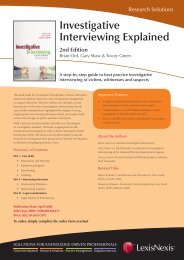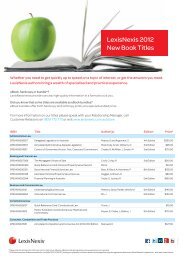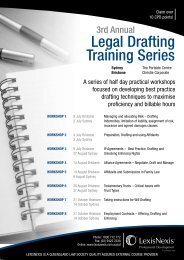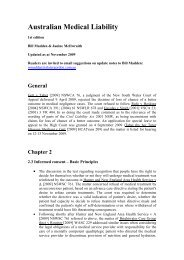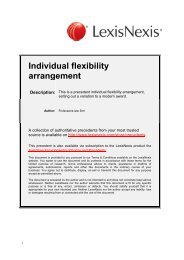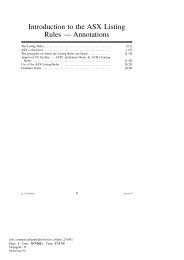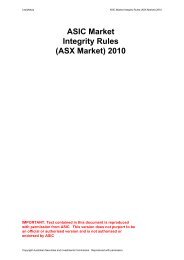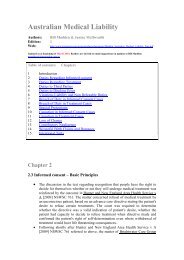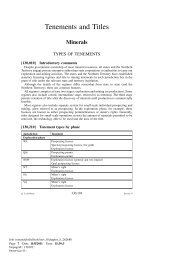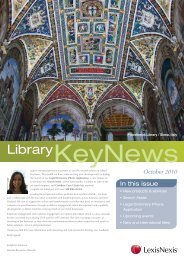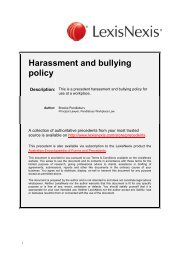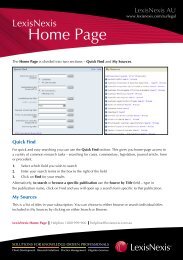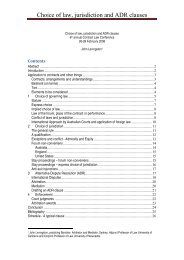pdf version - LexisNexis
pdf version - LexisNexis
pdf version - LexisNexis
Create successful ePaper yourself
Turn your PDF publications into a flip-book with our unique Google optimized e-Paper software.
CATCHWORDSKline v Official Secretary to the Governor GeneralAdministrative law − Freedom of information − Request for access to documents− Section 6A(1) of Freedom of Information Act 1982 (Cth) provided thatdocuments held by Official Secretary to the Governor-General were excludedfrom disclosure unless they related to "matters of an administrative nature" −Whether documents relating to nomination of person to Order of Australia wereexcluded from disclosure by operation of s 6A(1).Words and phrases − "matters of an administrative nature".Freedom of Information Act 1982 (Cth), ss 5, 6, 6A.
1 FRENCH CJ, CRENNAN, KIEFEL AND BELL JJ. The appellant, Ms Kline,made a request under s 15 of the Freedom of Information Act 1982 (Cth) ("theFOI Act") for access to certain categories of documents held by the firstrespondent, the Official Secretary to the Governor-General of theCommonwealth of Australia ("the Official Secretary"). The second respondent,the Administrative Appeals Tribunal ("the Tribunal"), filed an appearancesubmitting to any order the Court may make save as to costs.2 The documents in the request related to the Australian system of honours,the Order of Australia. They included two nomination forms for the making ofan award and correspondence in relation to those nominations, criteria formaking awards, working manuals, policy guidelines, and documents relating toreview processes. Subsequently, the appellant expanded her request to includean additional category of documents, being "all file notes from the Secretariat"contained in the nominations, which she made in 2007 and 2009.3 The decision of the Official Secretary 1 , an "agency" subject to theoperation of the FOI Act 2 , was conveyed in writing. In that communication itwas stated that some of the documents requested by the appellant did not exist.In relation to the balance, it was said that "no documents relating to matters of anadministrative nature" had been identified, being the only class of documents ofthe Official Secretary which are subject to obligations under the FOI Act 3 . Theletter also stated that the appellant would be provided with one copy of each ofthe two nominations she had made, but as those documents did not relate tomatters of an administrative nature, they were not subject to the FOI Act.4 On review, under s 55K of the FOI Act, the Australian InformationCommissioner ("the Commissioner") affirmed the Official Secretary's decision torefuse the appellant access to the documents she had requested. The appellantthen appealed to the Tribunal, which affirmed the Official Secretary's decision 4 .1 Authorised under s 23 of the FOI Act.2 FOI Act, s 4(1).3 See FOI Act, s 6A(1).4 Kline v Official Secretary to the Governor-General (2012) 127 ALD 639.
FrenchCrennanKiefelBellCJJJJ2.On an appeal on a question of law 5 , the Full Court of the Federal Court ofAustralia 6 upheld the Tribunal's decision 7 .This appeal5 A panel granted special leave to appeal limited to the following grounds:"That the Federal Court erred:(a)(b)(c)in holding that the Freedom of Information Act 1982 (Cth) ('theFOI Act') did not apply to the [appellant's] requests for access todocuments made on 26 and 30 January 2011 by reason of s 6A ofthat Act;in holding that any document that 'relates to [a] substantive poweror function' of the Governor General is not a document that 'relatesto matters of an administrative nature' within the meaning of s 6A,and is thereby excluded from the coverage of the Act; orin characterizing each document the subject of the requests as adocument that 'relates to [a] substantive power or function' of theGovernor General."6 The grounds show that the disposition of this appeal depends on theproper construction of s 6A of the FOI Act, set out below.The Order of Australia7 The Order of Australia was established by Letters Patent dated14 February 1975, in which it was recited: "it is desirable that there beestablished an Australian society of honour for the purpose of accordingrecognition to Australian citizens and other persons for achievement or formeritorious service". Accordingly, the Letters Patent established "a society ofhonour to be known as the 'Order of Australia'". The Constitution of the Order ofAustralia 8 ("the Constitution"), as amended, provides that the Governor-General5 Under s 44(1) of the Administrative Appeals Tribunal Act 1975 (Cth).6 Sitting pursuant to the Administrative Appeals Tribunal Act 1975 (Cth), s 44(3)(b).7 Kline v Official Secretary to the Governor-General (2012) 208 FCR 89.8 Schedule to the Letters Patent.
French CJCrennan JKiefel JBell J3.shall be the Chancellor of the Order and the Principal Companion in the GeneralDivision 9 , taking precedence, after the Sovereign, over all other members of theOrder 10 . The Governor-General "is charged with the administration of theOrder" 11 , a reference to the Governor-General's overall responsibility in respectof the Order. The Order has a General Division, which is relevant to theseproceedings, and a Military Division 12 .8 The Constitution also provides for an independent Council for the Orderconsisting of 19 members 13 and for the receipt of nominations from individualsor groups in the Australian community by the Secretary of the Order 14 , describedas appointed by the Governor-General 15 . The Council is empowered to considernominations to the General Division 16 , make recommendations to theGovernor-General in relation to those nominations, and advise theGovernor-General on such matters concerning the Order as theGovernor-General may refer to the Council for its consideration 17 . It was notcontested that research and inquiry carried out in the Office of the OfficialSecretary formed the basis of the Council's consideration of any nomination.Apart from receiving nominations, the functions of the Secretary of the Orderalso include maintaining the records of the Order and the Council and performingsuch other functions in respect of the Order as directed by the9 The Constitution, s 2(1).10 The Constitution, s 2A(1).11 The Constitution, s 3.12 The Constitution, s 1(1).13 The Constitution, s 4.14 The Constitution, s 19.15 The Constitution, s 6(1).16 Appointments to the Order and awards of the Medal of the Order in the MilitaryDivision are made by the Governor-General on the recommendation of the Ministerfor Defence.17 The Constitution, s 5.
FrenchCrennanKiefelBellCJJJJ4.Governor-General 18 . By convention and practice, the Official Secretary is theSecretary of the Order.9 The procedure in respect of a nomination for an appointment or award inthe Order of Australia was summarised by the Full Court 19 and does not need tobe repeated here, save to note that the nomination forms contain criteria and statethat all nominations are "strictly confidential". Appointments to the Order andawards of the Medal of the Order are made "with the approval of The Sovereign,by Instrument signed by the Governor-General and sealed with the Seal of theOrder." 20 The features of the Order described above ensure that the grant ofhonours in the General Division is rendered independent of government andpolitics.Relevant legislative provisions10 This appeal concerns the proper construction of s 6A of the FOI Act. Inparticular, it concerns the meaning of the phrase "unless the document relates tomatters of an administrative nature" in s 6A(1), which identifies the onlydocuments of the Official Secretary which are subject to the operation of the FOIAct. Before turning to the text of s 6A and the statutory scheme of which it is apart, it is convenient to say something more about the Governor-General and thestatutory functions of the Official Secretary.The Governor-General11 Section 61 in Ch II of the Australian Constitution vests the executivepower of the Commonwealth in the Queen and provides that such power isexercisable by her representative in Australia, the Governor-General. The grantof honours, once regarded as part of the prerogative of the Crown 21 , is nowencompassed in the executive power conferred by s 61 22 . These proceedings are18 The Constitution, s 6(2).19 Kline v Official Secretary to the Governor-General (2012) 208 FCR 89 at 92 [11].20 The Constitution, s 9.21 R (Bancoult) v Secretary of State for Foreign and Commonwealth Affairs (No 2)[2008] QB 365 at 398-399 [44]-[46].22 Cadia Holdings Pty Ltd v New South Wales (2010) 242 CLR 195 at 226 [86];[2010] HCA 27; Williams v Commonwealth (2012) 86 ALJR 713 at 723 [24] per(Footnote continues on next page)
French CJCrennan JKiefel JBell J5.not concerned with any of the many powers or functions of the Governor-Generalwhich involve acting on the advice of the Executive Council 23 . Whilst it isaccurate to describe the role of the Governor-General as having evolved sinceFederation 24 , Governors-General have exercised a range of constitutional 25 ,statutory, ceremonial and community responsibilities. The Governor-General'srole in respect of the Order reflects ceremonial and community responsibilities,as well as the Governor-General's constitutional position as the representative ofthe Sovereign in Australia.12 Sections 6 to 19 of the Governor-General Act 1974 (Cth) make provisionfor the office and functions of the Official Secretary. Relevantly, s 6 provides:"(1) There shall be an Official Secretary, who shall be appointed by theGovernor-General.(2) The Official Secretary, together with the staff employed undersection 13, constitute the Office of Official Secretary to theGovernor-General.(3) The function of the Office is to assist the Governor-General."13 Section 13 provides that the Official Secretary may employ a person as "amember of the Governor-General's staff." Section 6A(2) of the FOI Act providesthat a document in the possession of a person so employed, by reason of thatperson's employment, is taken to be in the possession of the Official Secretaryfor the purposes of the FOI Act. The Official Secretary determines theremuneration of staff 26 and may terminate the employment of a member ofFrench CJ, 747 [123] per Gummow and Bell JJ, 828 [582] per Kiefel J; 288 ALR410 at 417-418, 450, 559; [2012] HCA 23.23 As to which see R v Toohey; Ex parte Northern Land Council (1981) 151 CLR 170at 219 per Mason J; [1981] HCA 74; see also FAI Insurances Ltd v Winneke (1982)151 CLR 342; [1982] HCA 26.24 Winterton, "The Evolving Role of the Australian Governor-General", inGroves (ed), Law and Government in Australia, (2005) 44; Boyce, The Queen'sOther Realms, (2008) at 119-121 and 124-138.25 Constitution, ss 5, 32, 57, 58, 60, 61, 64, 70, 72, 103 and 128.26 Governor-General Act 1974 (Cth), s 14.
FrenchCrennanKiefelBellCJJJJ6.staff 27 . The Official Secretary is required to prepare and furnish an annual reporton the performance of the functions and duties of the Official Secretary, which isultimately laid before both Houses of Parliament 28 . The Official Secretary alsohas statutory responsibilities under the Financial Management andAccountability Act 1997 (Cth). The evidence showed that the Governor-Generalis assisted and supported by the Office of the Official Secretary in two ways.First, the Office assists and supports the Governor-General in respect of allaspects of the Governor-General's role, which includes assisting and supportingthe Governor-General's discharge of substantive powers and functions in respectof the Order. Secondly, the Governor-General is assisted and supported by themanagement and administration of office resources, such as financial and humanresources and information technology. The distinction between the two forms ofsupport will need to be borne in mind when approaching the task of construings 6A(1).The FOI Act14 The general objects of the FOI Act are to give the Australian communityaccess to information held by the Commonwealth Government, thereby"promoting better-informed decision-making" and permitting "increasingscrutiny" of the Government's activities 29 . Those objects are to be achieved byrequiring "agencies" which are subject to the operation of the FOI Act 30 to"publish ... information" and to "provid[e] ... access to documents." 31 Thepowers and functions given by the FOI Act to achieve its objects are to beperformed and exercised, as far as possible, promptly and at the lowestreasonable cost 32 .15 Relevantly, "agency" is defined to include "a Department" or "aprescribed authority", which latter term is defined, in turn, to include the person27 Governor-General Act 1974 (Cth), s 15(1).28 Governor-General Act 1974 (Cth), s 19.29 FOI Act, s 3(2).30 FOI Act, ss 4 and 7.31 FOI Act, s 3(1).32 FOI Act, s 3(4).
French CJCrennan JKiefel JBell J7.holding, or performing the duties of, an office established by an enactment 33 .Whilst neither the Governor-General, the Council for the Order, nor the Office ofthe Official Secretary is "a prescribed authority", the Official Secretary is 34 , andis therefore an "agency" for the purposes of the FOI Act.16 The statutory obligations to give access to certain documents 35 and topublish certain information 36 are then qualified by specified exemptions.Relevantly, courts, specified tribunals and the Official Secretary are excludedfrom the statutory obligation to grant access to a document "unless the documentrelates to matters of an administrative nature." 37 In addition, a document of aMinister that is not an "official document of a Minister" is exempt from theoperation of the FOI Act 38 .17 Division 2 of Pt II of the FOI Act 39 identifies information which agenciesmust publish, which includes "operational information" 40 , about which more willbe said later. Part III 41 governs the access which must be given to documents.Relevantly, s 11 provides that a person has a legally enforceable right to obtainaccess to a document of an agency, other than an exempt document. A personseeking access to a document must make a "request" 42 , which may be refused ifthe document cannot be found or does not exist 43 or if the work involved inprocessing the request would substantially and unreasonably direct the resources33 FOI Act, s 4(1).34 FOI Act, s 4(1), par (c) of the definition of "prescribed authority".35 FOI Act, ss 11 and 11A(3).36 FOI Act, s 7A.37 FOI Act, ss 5, 6 and 6A(1).38 FOI Act, s 4(1), definition of "official document of a Minister" and s 11(1)(b).39 FOI Act, ss 8-8E.40 FOI Act, ss 7A and 8A.41 FOI Act, ss 11-31.42 FOI Act, ss 11A, 15, 16 and 17.43 FOI Act, s 24A.
FrenchCrennanKiefelBellCJJJJ8.of the agency from its other operations 44 . Division 2 of Pt IV 45 provides for adiverse group of exemptions from the obligations imposed by the FOI Act.Relevantly included as exempt are "[d]ocuments containing material obtained inconfidence" 46 . Division 3 of Pt IV 47 contains a scheme of conditionalexemptions, including documents disclosing "deliberative matter" 48 , where thereis a public interest to be served by non-disclosure.18 The crucial provision for the purposes of these proceedings is s 6A 49 ,which provides:"(1) This Act does not apply to any request for access to a document ofthe Official Secretary to the Governor-General unless the documentrelates to matters of an administrative nature.(2) For the purposes of this Act, a document in the possession of aperson employed under section 13 of the Governor-General Act1974 that is in his or her possession by reason of his or heremployment under that section shall be taken to be in thepossession of the Official Secretary to the Governor-General."(emphasis added)19 It should be noted that the drafting technique emphasised above is usedelsewhere in the FOI Act. Sections 5 and 6 deem a federal court 50 or a specifiedtribunal, authority or body 51 to be a "prescribed authority". However, the FOIAct does not apply to any request for access to a document of either a court or a44 FOI Act, ss 24, 24AA and 24AB.45 FOI Act, ss 33-47A.46 FOI Act, s 45.47 FOI Act, ss 47B-47J.48 FOI Act, s 47C.49 Introduced in 1984 by the Public Service Reform Act 1984 (Cth), s 154.50 See, for example, Constitution, s 71 and Federal Court of Australia Act 1976 (Cth),s 5.51 Encompassed by Constitution, Ch II.
French CJCrennan JKiefel JBell J9.specified tribunal, authority or body "unless the document relates to matters of anadministrative nature."20 It can also be noted that Sched 1 to the FOI Act, entitled "Courts andtribunals exempt in respect of non-administrative matters", exempts three entitiesfrom the operation of the Act. Pursuant to s 7, Pt I of Sched 2 lists agencieswhich are also exempt, and Pt II of Sched 2 lists agencies which are exempt fromgranting a right of access to particular documents.The decision of the Tribunal21 The Tribunal affirmed the decision of the Official Secretary to refuse theappellant access to documents which were the subject of her request. Inaccordance with an agreement reached between the parties, the Tribunal did notscrutinise the requested documents in detail. The Tribunal noted that if anycategories of documents to which the appellant had requested access did not fallwithin the exception in s 6A(1), it would be necessary to consider at a furtherhearing whether such documents were exempt from disclosure by reference tosome other provision of the FOI Act. The Tribunal found that the OfficialSecretary held some documents which fell within the categories the appellant hadrequested.22 The Tribunal considered that documents generated in connection with theconferral of honours in the Order related to substantive functions of theGovernor-General. Accordingly, as the documents requested "squarely relate[d]to the operation of the system of honours" 52 , the Tribunal considered that none ofthe documents, or categories of documents, related to "matters of anadministrative nature" within the meaning of s 6A(1) of the FOI Act. TheTribunal affirmed the decision under review.The decision of the Full Court23 The Full Court held that the relevant distinction drawn by s 6A(1) of theFOI Act, between "matters of an administrative nature" and matters which werenot of such a nature, reflected a distinction between the substantive powers andfunctions of the Governor-General and the "apparatus" for the exercise of thosepowers or functions, which was merely supportive 53 . The Full Court considered52 Kline v Official Secretary to the Governor-General (2012) 127 ALD 639 at644-645 [24].53 Kline v Official Secretary to the Governor-General (2012) 208 FCR 89 at 95 [21].
FrenchCrennanKiefelBellCJJJJ10.that the terms of the appellant's request for documents referred to a substantivepower or function, namely the administration of the Order of Australia. Inparticular, that substantive power or function involved nominations forappointments and awards, and consideration of those nominations, whichculminated in a decision of whether or not to appoint or award a particularperson. It followed that the appellant's request sought access to documentsrelating to that substantive power, which were excluded from disclosure unders 6A(1) of the FOI Act.24 In reviewing the Tribunal's decision and dismissing the appeal before it,the Full Court found that it was sufficient for the Tribunal to determine whetherthe categories of documents identified in the appellant's request were documentsrelating to "matters of an administrative nature". It was not necessary, in the FullCourt's view, for the Tribunal to examine each document individually as "thecharacter of the documents was apparent from the terms of the request." 54Submissions25 On behalf of the appellant it was contended that the question before theTribunal was whether the appellant's request for access to documents of theOfficial Secretary was capable of covering documents which related to mattersof an administrative nature. If the appellant succeeded on that issue, theexclusion from the operation of the FOI Act, contained in s 6A(1), would notapply to the documents. The matter should then be remitted to the Tribunal toconsider whether any (or any part) of some 400 documents (comprising about1500 pages), which were covered by the appellant's request, were excluded fromdisclosure by virtue of some provision of the FOI Act other than s 6A(1), such asprovisions exempting confidential documents from disclosure. In oral argument,it was further submitted that such inspection might also show that the documentsrequested did indeed fall within the exclusion provided by s 6A(1), because theydisclosed some aspect of the decision-making processes relevant to the Order.26 Appealing to text, context and legislative history, it was contended for theappellant that the exception in s 6A(1) should be construed widely, such that theonly documents of the Official Secretary excluded from the operation of the FOIAct were documents which disclosed any aspect of the decision-making processin respect of a particular nomination for the Order. A correlative submission wasthat documents unrelated to that decision-making process "prima facie would beadministrative and not disclose anything confidential." The distinction between54 Kline v Official Secretary to the Governor-General (2012) 208 FCR 89 at 97 [29].
French CJCrennan JKiefel JBell J11.the two categories was said to identify the boundary between what s 6A(1)excluded and what it included, for the purposes of access to documents under theFOI Act.27 Contextual matters relied upon by the appellant in support of thosesubmissions included the examples given to illustrate the "operationalinformation" required to be published 55 , as defined under s 8A 56 , and the distinctexemption of agencies such as the Australian Security Intelligence Organisation("ASIO") from the statutory scheme under the FOI Act, compared with theinclusion of the Official Secretary. The underlying purpose and operation of ss 5and 6 of the FOI Act were said to be analogous to the underlying purpose andoperation of s 6A, elucidated, it was submitted, by Bienstein v Family Court ofAustralia 57 .28 Relying on some analogy between functions of the Governor-General andjudicial officers, as holders of independent office, the appellant identified thepublic interest underpinning s 6A(1) as the public interest in the independent andimpartial discharge of the substantive powers and functions of theGovernor-General, as decision-maker, and in this case as decision-maker inrespect of the Order. That led to a submission that secrecy or confidentiality inrespect of the Governor-General's responsibilities concerning the Order was notthe dominant public interest protected by s 6A, because that interest wasspecifically covered by other provisions in the FOI Act.29 The competing contention of the first respondent was that the exception ins 6A(1) should be construed narrowly. It was submitted that s 6A(1) operates tooblige the Official Secretary only to give access to documents under the FOI Actwhich involved the management or administration of the Office. That limitedpurpose was said to be clear from the text of s 6A(1) and its wider context. Thewider context included the circumstance that the Governor-General was excludedfrom all statutory obligations imposed by the FOI Act, and the Official Secretarywas only covered by s 6A to the same limited extent as courts and tribunals werecovered by ss 5 and 6. The exception in s 6A(1), so construed, was said to55 FOI Act, s 8(2)(j).56 These were an agency's rules, guidelines, practices and precedents relating to"decisions or recommendations affecting members of the public (or any particularperson or entity, or class of persons or entities)." See FOI Act, s 8A(1).57 (2008) 170 FCR 382.
FrenchCrennanKiefelBellCJJJJ12.adequately serve the object of "public scrutiny" of the Government's processesand activities identified in the FOI Act 58 .30 Further, the purposive construction of the exception in s 6A(1), profferedby the first respondent, was said to be supported by a number of factors: theheterogeneous nature of the Governor-General's substantive powers andfunctions; the function of the Official Secretary to assist and support theGovernor-General in relation to all of those diverse powers and functions; andextrinsic materials containing statements regarding the legislative purposeunderpinning ss 5 and 6.31 Generally, it was submitted that the appellant was not seeking documentswhich related to the management or administration of the Office, such as theoffice resources. Rather, the appellant was seeking documents which wouldelucidate the failure of her two nominations, whilst eschewing any right to begiven access to any documents which disclosed the precise reasons for thatfailure."Matters of an administrative nature"32 The task of construing s 6A(1) of the FOI Act is governed by what hasbeen said in this Court recently about the importance of the text of a statute, themeaning and effect of which are not to be displaced by statements in secondarymaterials 59 . A purposive construction of s 6A(1) accords with s 15AA of theActs Interpretation Act 1901 (Cth). Further, cognate expressions in a statuteshould be given the same meaning unless the context requires a different result 60 .33 A preliminary consideration of considerable contextual significance is thatthe Governor-General is not subject to the operation of the FOI Act. Stating thesame point positively, and utilising the nomenclature of the FOI Act, theGovernor-General is exempted from the operation of that Act. TheGovernor-General does not fall within the definition of an "agency" or58 FOI Act, s 3(2).59 Northern Territory v Collins (2008) 235 CLR 619 at 642 [99]; [2008] HCA 49;Alcan (NT) Alumina Pty Ltd v Commissioner of Territory Revenue (2009) 239 CLR27 at 47 [47]; [2009] HCA 41; Saeed v Minister for Immigration and Citizenship(2010) 241 CLR 252 at 265 [33]; [2010] HCA 23.60 Registrar of Titles (WA) v Franzon (1975) 132 CLR 611 at 618 per Mason J;[1975] HCA 41.
French CJCrennan JKiefel JBell J13."prescribed authority" in the FOI Act. The Governor-General is appointed byLetters Patent, pursuant to s 2 of the Australian Constitution, and therefore doesnot hold office in accordance with the provisions of an enactment of the federalParliament or an Order-in-Council 61 . Similarly, the federal Parliament 62 andJustices of the High Court of Australia are not subject to the operation of the FOIAct. Further, holders of federal judicial office and holders of office in specifiedfederal tribunals, authorities and bodies are expressly exempted from theoperation of the provisions of the FOI Act 63 . In summary, certain individuals,including the Governor-General, who hold independent offices pursuant to theAustralian Constitution or a federal enactment, requiring the impartial dischargeof the powers and functions of such office, are not subject to the operation of theFOI Act.34 Thus the processes and activities of government, which are opened toincreased public scrutiny by the operation of the FOI Act, do not include thoseassociated with the exercise of the Governor-General's substantive powers andfunctions, many (even most) of which are exercised in public. Similarly, the FOIAct does not expose to public scrutiny the discharge of the substantive powersand functions of judicial officers or holders of quasi-judicial office to the extentthat they have not been discharged in an open court or a public forum.Independence from government and the public is important in relation to theexercise of the various responsibilities of the Governor-General, including, butnot limited to, the making of decisions. Furthermore, freedom from interferenceor scrutiny by members of the public (or other branches of government) is anessential aspect of the making of decisions in relation to the General Division ofthe Order.35 The first matter of textual significance is that the Official Secretary is"a prescribed authority" subject to the operation of the FOI Act as a personholding, or performing, the duties of that office under the Governor-General Act1974 (Cth).36 The next matter of textual significance is that s 6A(1), and ss 5(1) and 6,reveal a plain intention to constrain the extent to which the FOI Act pursues its61 FOI Act, s 4(1), definition of "prescribed authority".62 Documents in the possession of a Minister in his or her capacity as a member ofParliament are not subject to the operation of the FOI Act: see FOI Act, s 11(1)(b)and the definition of "official document of a Minister" in s 4(1).63 FOI Act, ss 5(1)(b) and 6(b).
FrenchCrennanKiefelBellCJJJJ14.purposes and objects against persons (or entities) providing administrativesupport to individuals who hold independent offices and are not subject to theoperation of the FOI Act. The Official Secretary, like courts and other bodiesgoverned by the FOI Act, is only required to grant access to a limited class ofdocuments, characterised by a relationship between the document and subjectmatter of an "administrative nature". The meaning of that statutorycharacterisation cannot be determined without some reference to the FOI Act as awhole 64 , and the circumstance that the documents to which access must begranted are an exception to the position that the Governor-General is not subjectto the operation of the FOI Act.37 The FOI Act does not pursue its objects, as legislative purposes, at anycost 65 . The statutory scheme is complex in achieving a balance between theexposure of some government processes and activities to increased publicparticipation and scrutiny, by making information freely available to persons onrequest, and exempting other government processes and activities from publicparticipation and scrutiny, in order to secure a competing or conflicting publicinterest in non-disclosure. A clear example is the exemption of ASIO from theoperation of the FOI Act.38 The Governor-General, in common with judges, takes an oath toundertake his or her functions without fear or favour. However, as mentioned,the position of the Governor-General calls for the exercise of a multiplicity ofpowers and functions, many (but not all) of which are undertaken in public, andsome (but few) of which involve making decisions other than on the advice of aMinister or the Executive Council.39 The responsibility of the Governor-General for the administration of theOrder is a sui generis role involving processes and decision-making triggered bythe nomination of a person for an appointment or award. The proper independentdischarge of the Governor-General's responsibility for the administration of theOrder requires full and frank assistance to the Governor-General from theCouncil for the Order. The Council, in turn, requires full and frank assistance64 Project Blue Sky Inc v Australian Broadcasting Authority (1998) 194 CLR 355 at381 [69]; [1998] HCA 28.65 Carr v Western Australia (2007) 232 CLR 138 at 143 [5]; [2007] HCA 47, citedwith approval in Construction Forestry Mining and Energy Union v MammoetAustralia Pty Ltd (2013) 87 ALJR 1009 at 1016 [40]-[41]; 300 ALR 460 at 469;[2013] HCA 36.
French CJCrennan JKiefel JBell J15.from the Office of the Official Secretary. The possibilities of giving offence tofailed nominees, defamation, or political controversy in the administration of theGeneral Division of the Order are all avoided by the confidentiality of theselection process, which culminates in public announcement, in due course, ofappointments and awards in the Order. The Office supports the Council and theGovernor-General in completing the selection process.40 However, the task of statutory construction here is not resolved by askingwhether any particular document relates to processes and activities "supporting"the role of the Governor-General, because documents answering that descriptionfall within both the exclusion, and the exception, in s 6A(1).41 The "non-application" of the FOI Act to requests for access to documentsof the Official Secretary, as stated in s 6A(1), inevitably refers to a class ofdocuments relating to matters which are not "of an administrative nature". Inconformity with the exclusion of the Governor-General from the operation of theFOI Act, those documents relate to the discharge of the Governor-General'ssubstantive powers and functions. By contrast, the exception of a class ofdocument which relates to "matters of an administrative nature" connotesdocuments which concern the management and administration of officeresources, examples of which were given above 66 . This is a common enoughconnotation of the epithet "administrative" 67 . The Full Court apprehended thisdistinction in s 6A(1) correctly, referring to the latter class of documents asrelating to the office "apparatus" which supported the exercise of theGovernor-General's substantive powers and functions.42 The preceding construction of s 6A(1) governs its operation andapplication in relation to the range of diverse powers and functions of theGovernor-General in respect of which the Official Secretary may be called uponto provide assistance and support. The limited construction adopted by the FullCourt of the class of documents relating to "matters of an administrative nature"is appropriate because s 6A(1) must apply equally to powers and functions whoseexercise is of the greatest sensitivity, requiring high levels of confidentiality, as itmust apply to powers and functions of lesser sensitivity. The correctness of theconstruction of s 6A(1) adopted by the Full Court is illustrated by the specificcase of its application in relation to the Order. In that application it strikes abalance between the public interest in maintaining an Australian system of66 See [13].67 Burns v Australian National University (1982) 40 ALR 707 at 713-714.
FrenchCrennanKiefelBellCJJJJ16.honours and the public interest in efficient public administration, which issupported by the scrutiny for which the FOI Act provides.43 The first public interest or purpose is achieved by the exclusion fromdisclosure of documents relating to non-administrative matters. In relation to theOrder, these must include all unpublished documents associated with theadministration (that is, the operation) of the Order, involving, as it does, aconfidential selection process in respect of all nominations received within aparticular period.44 The second public interest and purpose is achieved by exposing to publicscrutiny documents of the Official Secretary which fall within the exception.The operation of the exception in relation to the Order must be governed by itsgeneral construction in application to that particular case. So applied, theexception can only be read as referring to documents relating to the managementand administration of the resources of the Office and is consistent with thegeneral non-application of the FOI Act to requests for access to documents of theOfficial Secretary.45 The analogous exclusion of federal courts and specified tribunals,authorities and bodies from the general operation of the FOI Act, except fordocuments which relate to matters of an administrative nature, also involves abalance of conflicting public interests. There is a long-recognised public interestin the protection of judicial independence to enable holders of judicial office toexercise authority without fear or favour − judges work in public, are obliged togive reasons, and are subject to appellate review 68 . However, not every actionundertaken by a judge in the discharge of the substantive powers and functions ofadjudication is undertaken in public. For example, revision of an unrevisedtranscript of proceedings heard in open court may occur in chambers. That taskis referable to the exercise of judicial, rather than administrative, powers andfunctions 69 .46 Similar policy considerations apply in respect of specified tribunals,authorities or bodies. Holders of office in such bodies also exercise authoritywithout fear or favour. Determinations are made in public, but distinctconciliatory functions may depend for their success on confidentiality so as to68 Fingleton v The Queen (2005) 227 CLR 166 at 186 [38]-[39] per Gleeson CJ;[2005] HCA 34; Herijanto v Refugee Review Tribunal (2000) 74 ALJR 698 at700-701 [13]-[16] per Gaudron J; 170 ALR 379 at 382-383; [2000] HCA 16.69 Loughnan v Altman (1992) 39 FCR 90.
French CJCrennan JKiefel JBell J17.ensure full and frank private discussions designed to effect the settlement of, forexample, an industrial dispute.47 Accordingly, the only documents which courts and specified tribunals,authorities and bodies are obliged to open to increased public scrutiny are thosedocuments relating to the management and administration of registry and officeresources.48 Whilst the proper construction of s 6A(1) plainly emerges from aconsideration of the textual and contextual matters discussed, that construction isfortified by resort to statements in relevant secondary materials.49 In brief, s 6A(1) of the FOI Act, which was inserted in 1984, drew uponthe language of ss 5(1) and 6, which were included in the FOI Act as originallyenacted. In the relevant parliamentary debates, Senator Evans described theoperation of ss 5 and 6 and explained their object. He said 70 :"courts, judicial offices, certain industrial tribunals and their registries ...are not exempt from the operation of the [FOI] Act so far as theiradministrative procedures, properly so-called, are concerned."50 The Senator went on to explain that the inclusion of ss 5 and 6 wouldsecure a legitimate public interest in "efficient administration" and was notintended to intrude on the independence of the judiciary 71 .51 In Bienstein 72 , the respondent denied the applicant's request for access toall documents relating to the case management of her matters before it. It wasdecided in Bienstein that ss 5 and 6 of the FOI Act were not intended to extend sofar as requiring the giving of access to documents that would put judicialindependence, or the independence of other institutions, at risk 73 . However, itwas also decided that the verbiage "relates to matters of an administrativenature", as it occurs in s 5 of the FOI Act, can include documents relating tojudicial functions and decision-making. The next step in the reasoning was thatdocuments which would not impinge on the independence essential to the70 Australia, Senate, Parliamentary Debates (Hansard), 7 May 1981 at 1768.71 Australia, Senate, Parliamentary Debates (Hansard), 7 May 1981 at 1768.72 (2008) 170 FCR 382.73 (2008) 170 FCR 382 at 400 [54].
FrenchCrennanKiefelBellCJJJJ18.exercise of judicial or decision-making functions were documents relating tomatters of an administrative nature 74 . That reasoning was relied on by theappellant to support the proposition that the only documents of the OfficialSecretary which were excluded from disclosure under s 6A(1) were documentsrelating to the substantive powers and functions of the Governor-General asdecision-maker. That aspect of the reasoning in Bienstein is erroneous. First, thereferences in the extrinsic materials to examples of "administrative matters", suchas the number of sitting days of a court, were misread in Bienstein as suggestingthat even documents held by a court which related to individual cases might becharacterised as documents "relating to 'matters of an administrative nature'." 75Secondly, it was decided that since some powers and functions of a judicialofficer were administrative in nature, those administrative powers and functionswhich were not closely related to judicial independence would not needprotection from the operation of the FOI Act 76 . However, that reasoning,deriving from the different factual circumstances in Fingleton v The Queen 77 ,accords no weight to the circumstance that a judicial officer is not subject to theoperation of the FOI Act. Only a registry or office of a court or specified tribunalis subject to the operation of the FOI Act, and then only in respect of documentsrelating to administrative matters. The approach in Bienstein, relied on by theappellant, is not apt for application to s 6A(1). That approach would not accordproper weight to the circumstance that the Governor-General is not subject to theoperation of the FOI Act and would result in an impractical and unwieldyapproach to the application of s 6A(1), contrary to the provision that publicaccess to information is to be achieved promptly and at the lowest reasonablecost 78 .Application of s 6A(1) to the appellant's requestCorrespondence and file notes relating to nominations52 Correspondence and file notes relating to the appellant's nominations aredirectly related to the Governor-General's exercise of substantive powers and74 (2008) 170 FCR 382 at 399-400 [53]-[54].75 (2008) 170 FCR 382 at 399 [53].76 (2008) 170 FCR 382 at 403 [67].77 (2005) 227 CLR 166.78 FOI Act, s 3(4).
French CJCrennan JKiefel JBell J19.functions in respect of the Order. These are excluded from disclosure as they donot fall within the exception in s 6A(1) of the FOI Act.Criteria for making awards53 Relevant criteria for the making of awards are explained in the nominationform, which is a document that is available to the public.Working manuals and policy guidelines54 To the extent that relevant criteria are further explained in workingmanuals or policy guidelines, the evidence showed that those documents wereused in processes and activities concerned with the Governor-General's exerciseof substantive powers and functions in respect of the Order. Those are excludedfrom disclosure, as they do not fall within the exception in s 6A(1).55 It has been mentioned that s 8 of the FOI Act obliges publication of anagency's "operational information", being information held by the agency toassist the agency in "making decisions or recommendations affecting members ofthe public" 79 . The appellant drew comfort from the circumstance that an agency's"guidelines" and "practices and precedents relating to [the agency's] decisionsand recommendations" are cited as examples of the kinds of documents coveredby the expression "operational information". However, the Governor-General'sinformation relevant to decisions made in respect of the Order is not subject tothe operation of the FOI Act. Further, the Official Secretary does not makedecisions or recommendations affecting members of the public;recommendations in respect of the General Division of the Order are made by theCouncil for the Order and ultimate decisions as to the appointment or the makingof awards repose with the Chancellor of the Order, the Governor-General.Documents relating to review processes56 No documents relating to review processes are in existence, but theOfficial Secretary accepted that if such documents were brought into existence,they would be available to the public without recourse to the FOI Act.79 FOI Act, s 8A.
FrenchCrennanKiefelBellCJJJJ20.Conclusion and orders57 There was no error in the Tribunal's decision. Accordingly, the groundsof appeal in respect of the decision of the Full Court were not made out.The appeal should be dismissed with costs.
Gageler J21.GAGELER J.Introduction58 The Freedom of Information Act 1982 (Cth) ("the FOI Act") confers rightsto obtain, on request, access to documents in the possession of "agencies" as wellas official documents in the possession of Ministers of State of theCommonwealth. Departments of State of the Commonwealth and "prescribedauthorities" are agencies. Most bodies established by Acts of the CommonwealthParliament are prescribed authorities, as are most persons holding officesestablished by Acts of the Commonwealth Parliament.59 Courts (but not judges) are deemed to be prescribed authorities. Specifiedindustrial bodies such as the Australian Industrial Relations Commission (but nottheir members) are similarly deemed to be prescribed authorities. The OfficialSecretary to the Governor-General, by virtue of holding an office established bythe Governor-General Act 1974 (Cth), is also a prescribed authority. TheGovernor-General is not.60 The FOI Act is expressed (in ss 5, 6 and 6A respectively) to have noapplication to a request for access to a document in the possession of a court, aspecified industrial body or the Official Secretary "unless the document relates tomatters of an administrative nature".61 The question of statutory construction on which this appeal turns is: whenis a document a document that "relates to matters of an administrative nature"?Legislative history62 In answering that question, "a page of history is worth a volume oflogic" 80 .63 Sections 5 and 6 were in the FOI Act as originally enacted in 1982. Theywere inserted into the Bill for the FOI Act by amendment in the Senate in 1981 81 .The purpose of the amendment was to give effect to recommendations made bythe Senate Standing Committee on Constitutional and Legal Affairs in 1979 82 .80 Cf New York Trust Co v Eisner 256 US 345 at 349 (1921).81 Australia, Senate, Parliamentary Debates (Hansard), 7 May 1981 at 1767-1776.82 Australia, Senate Standing Committee on Constitutional and Legal Affairs, Reportby the Senate Standing Committee on Constitutional and Legal Affairs on theFreedom of Information Bill 1978, and aspects of the Archives Bill 1978, (1979) at158 [12.29]-[12.30], 159-160 [12.33]-[12.34].
GagelerJ64 The Senate Standing Committee had recommended amending what hadbeen proposed in the original form of the Bill as a wholesale exemption of courtsand industrial bodies from the FOI Act so as to limit the exemption in respect ofcourts "to documents of a non-administrative character" 83 and in respect ofindustrial bodies to "their non-administrative functions only" 84 . Explaining thereasons for its recommendation to limit the exemption in respect of courts, theSenate Standing Committee said 85 :22."There is obviously very good reason for governments not imposingrequirements which would interfere with the independence of the judiciaryand the proper administration of justice. It would not be appropriate forfreedom of information legislation to be the vehicle for obtaining access,where this was otherwise unavailable, to court documents filed by partiesto litigation. Nor would it be appropriate for this legislation to operate inany way as a substitute or supplement for discovery procedures presentlyadministered by the courts."The Senate Standing Committee continued 86 :"However, there are other documents of a more clearly administrativecharacter associated with the functioning of registries and collection ofstatistics on a host of matters associated with judicial administrationwhich, equally clearly, should be opened up to public gaze. These wouldinclude such matters as the number of sitting days, the number of casesdetermined, the number of cases withdrawn, the cases which were83 Australia, Senate Standing Committee on Constitutional and Legal Affairs, Reportby the Senate Standing Committee on Constitutional and Legal Affairs on theFreedom of Information Bill 1978, and aspects of the Archives Bill 1978, (1979) at158 [12.30].84 Australia, Senate Standing Committee on Constitutional and Legal Affairs, Reportby the Senate Standing Committee on Constitutional and Legal Affairs on theFreedom of Information Bill 1978, and aspects of the Archives Bill 1978, (1979) at160 [12.34].85 Australia, Senate Standing Committee on Constitutional and Legal Affairs, Reportby the Senate Standing Committee on Constitutional and Legal Affairs on theFreedom of Information Bill 1978, and aspects of the Archives Bill 1978, (1979) at158 [12.29].86 Australia, Senate Standing Committee on Constitutional and Legal Affairs, Reportby the Senate Standing Committee on Constitutional and Legal Affairs on theFreedom of Information Bill 1978, and aspects of the Archives Bill 1978, (1979) at158 [12.29].
Gageler J23.subsequently appealed and the occasions on which bail was awarded. Thevery existence within the Commonwealth Attorney-General's Departmentof a Division of Judicial Administration is testimony to the ability todistinguish between the judicial and administrative aspects of theoperation of the courts."65 What was the Division of Judicial Administration within the Attorney-General's Department doing in 1979 to allow its "very existence" to be"testimony to the ability to distinguish between the judicial and administrativeaspects of the operation of the courts"? The answer was apparent from theAnnual Report of the Attorney-General's Department 87 . In anticipation of theenactment of the High Court of Australia Act 1979 (Cth), the Division wasproviding "administrative assistance in the development of an independentsystem of judicial administration" as well as providing "assistance in the detailedplanning, furnishing and the general fitting out of the High Court building inCanberra and in matters associated with the move of the High Court toCanberra" 88 . The Attorney-General's Department was in the meantime providingstaff and "management services" for the Sydney and Melbourne registries of theHigh Court as well as "registry services", in addition to providing ongoing"management services and general administrative assistance" to the FederalCourt as well as staffing and maintaining registries of the Family Court 89 .66 With the commencement of the High Court of Australia Act 1979 (Cth) in1980, it became the responsibility of the High Court itself to "administer its ownaffairs" 90 and for that purpose the High Court was given power "to do all things… necessary or convenient to be done for or in connection with theadministration of its affairs" including, without limitation, power to: enter intocontracts; acquire, hold and dispose of property; take on hire, exchange, andaccept on deposit or loan, library material and also furnishings, equipment andgoods needed for the purposes of the Court; and control and manage any land orbuilding occupied by the Court and any adjacent land or building that is part ofthe precincts of the Court 91 .87 Australia, Attorney-General's Department, Annual Report 1978-1979, (1979).88 Australia, Attorney-General's Department, Annual Report 1978-1979, (1979) at 43.89 Australia, Attorney-General's Department, Annual Report 1978-1979, (1979) at 44.90 Section 17(1).91 Section 17(2).
GagelerJ67 Speaking in favour of the relevant amendment to the Bill for the FOI Actin the Senate in 1981, Senator Evans drew attention to the then recent enactmentof the High Court of Australia Act 1979 (Cth) when he said 92 :24."The utility, or indeed the necessity, for an exemption for administrativequestions of this kind is in fact made more obvious by the recent change inthe legislation governing the High Court of Australia. These sorts ofadministrative questions are now clearly within the Court's jurisdiction,whereas previously the majority of administrative matters of this kindwere performed by or through the Attorney-General's Department and assuch were the subject of ordinary access procedures so far as informationwas concerned."68 The word "administrative" was obviously being used by the SenateStanding Committee in 1979 and by Senator Evans in 1981 in a sense narrowerand more specific than the same word had earlier been used in the AdministrativeDecisions (Judicial Review) Act 1977 (Cth) as part of the definition of a decisionto which that Act was to apply. The focus of the amendment to the Bill for theFOI Act recommended in 1979 and implemented in 1981 was not on theseparation of judicial power from executive power – after all, the samedistinction between "administrative" and "non-administrative" was beingemployed in respect of industrial bodies which did not exercise judicial power.The focus was more prosaically on ensuring inclusion within the scope of theFOI Act of documents in the possession of courts and industrial bodies whichrelated to matters of organisation and management of the kind which in 1979were still being provided to the High Court by the Division of JudicialAdministration within the Attorney-General's Department and of the kind whichby 1981 had been taken over by the High Court itself with the commencement ofthe High Court of Australia Act 1979 (Cth) in 1980.69 Section 6A was then inserted into the FOI Act two years later by thePublic Service Reform Act 1984 (Cth) 93 . Its insertion was contemporaneouswith, and consequential upon, the amendment by the Public Service Reform Act1984 (Cth) of the Governor-General Act 1974 (Cth) which created the statutoryoffice of Official Secretary 94 . Immediately before those amendments in 1984,the Official Secretary had been an officer of the Australian Public Service92 Australia, Senate, Parliamentary Debates (Hansard), 7 May 1981 at 1768.93 Section 154 of the Public Service Reform Act 1984 (Cth).94 Section 141 of the Public Service Reform Act 1984 (Cth), inserting s 6 of theGovernor-General Act 1974 (Cth).
Gageler J25.seconded to the Governor-General's staff from the Department of the PrimeMinister and Cabinet 95 .70 The identity of the language used in s 6A of the FOI Act and the languageused in ss 5 and 6 of the FOI Act suggests that the same distinction was beingdrawn in 1984 to govern inclusion within the scope of the FOI Act of documentsin the possession of the Official Secretary as had earlier been drawn to governinclusion within the scope of the FOI Act of documents in the possession of acourt or industrial body.Construction71 The Full Court of the Federal Court, in the decision under appeal, held thedistinction drawn by s 6A of the FOI Act to be between "substantive powers andfunctions" and the "apparatus" supporting the exercise or performance of thosesubstantive powers and functions 96 .72 The legislative history compels the conclusion that that is not only acorrect distillation of the distinction drawn by s 6A of the FOI Act, but also acorrect distillation of the distinction drawn by ss 5 and 6 of the FOI Act.Bienstein v Family Court of Australia 97 , which reached a different conclusion inrelation to s 5 of the FOI Act, was wrongly decided.73 Sections 5, 6 and 6A of the FOI Act draw a dichotomy betweendocuments which relate to "administrative matters" and those which do not. Theword "administrative" is used in each of those sections in the primary sense of"[p]ertaining to, or dealing with, the conduct or management of affairs" 98 .74 The relevant affairs, or "matters", to which each of ss 5, 6 and 6A of theFOI Act refers, are distinct from, but incidental to, the exercise or performance ofsubstantive powers or functions in the sense of providing logistical support (orinfrastructure or physical necessities or resources or platform) for the exercise orperformance of those substantive powers or functions to be able to occur.75 The distinction sought to be drawn by the appellant between documentswhich "relate to administrative tasks … to support or assist the exercise of …95 Australia, Senate, Public Service Reform Bill 1984, Explanatory Memorandum at47.96 Kline v Official Secretary to the Governor-General (2012) 208 FCR 89 at 95 [21].97 (2008) 170 FCR 382.98 Oxford English Dictionary, 2nd ed (1989), vol 1 at 163.
GagelerJ26.powers or the [performance] of … functions", on the one hand, and documentswhich answer that description but which would "disclose the decision-makingprocess involved in the exercise of those powers or performance of thosefunctions in a particular matter or context", on the other, is too fine to besustained. The true distinction is more robust and more practical.76 Matters which do not relate to the provision of logistical support do notbecome "administrative" merely because they are in some way preparatory to anexercise of a substantive power or to the performance of a substantive function.77 The Governor-General has many functions, some of which areceremonial. Were, for example, the Governor-General to travel to a remotelocation to attend a ceremony in her official capacity, documents relating totravel by and accommodation for the Governor-General and her entourage wouldrelate to matters of an administrative nature within the meaning of s 6A andwould therefore fall within the scope of the FOI Act. Documents relating to theGovernor-General's participation in the ceremony, whether generic or specificand whether prepared or received by the Governor-General or by the OfficialSecretary before or after the Governor-General's participation in the particularceremony, would not relate to matters of an administrative nature within themeaning of s 6A and would therefore fall outside the scope of the FOI Act.Application78 To the extent that they remain material to this appeal, the categories ofdocuments in the possession of the Official Secretary to which the appellantsought access comprised: correspondence held by the Official Secretary inrelation to the appellant's nominations of a named person for an Order ofAustralia; working manuals, policy guidelines and criteria related to theadministration of the Order of Australia; documents relating to review processes;and "file notes from the Secretariat" (being in fact the Office of OfficialSecretary) concerning the nominations.79 All of those categories on their face relate to the exercise of thesubstantive function which the Governor-General performs as Chancellor of theOrder of Australia pursuant to Letters Patent issued by the Queen 99 . All relate tothe "administration" of the Order of Australia within the meaning of the LettersPatent 100 , but none relates to matters of an "administrative nature" within themeaning of s 6A of the FOI Act. None, therefore, falls within the scope of theFOI Act.99 Constitution of the Order of Australia.100 Section 3 of the Constitution of the Order of Australia.
Gageler J80 The Full Court of the Federal Court rightly held that the AdministrativeAppeals Tribunal was correct in law in so finding.Conclusion81 For these reasons, the appeal should be dismissed.27.



